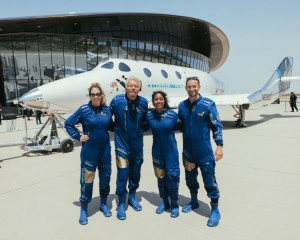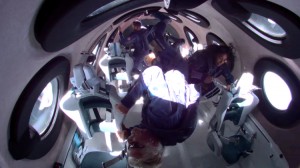Branson Beats Bezos in Billionaire Space Race

British businessman Richard Branson poses in front of the spaceplane VSS Unity with the other missions specialists of Virgin Galactic’s Unity-22 mission. The glass-paneled terminal of Spaceport America is visible in the background. From left to right: Beth Moses, Chief Astronaut Instructor; Branson; Sirisha Bandla, Vice President of Government Affairs and Research Operations; Colin Bennett, Lead Operations Engineer.
Credit: © Virgin Galactic
After years of delay, the age of space tourism may finally be upon us. On Sunday morning, the British businessman Richard Branson flew aboard his company Virgin Galactic’s spaceplane in a suborbital flight. Soon, paying customers will get their turn to go to space.
Branson rode with five other members of his company on VSS Unity.VSS Unity is a SpaceShipTwo model spaceplane. A special aircraft called a WhiteKnightTwo takes off from a runway carrying a SpaceShipTwo. A WhiteKnightTwo named VMS Eve took off from Spaceport America in New Mexico and carried VSS Unity up above 45,0000 feet (14,000 meters). After Eve released Unity, pilots ignited a rocket engine and the craft soared up to 300,000 feet (90,000 meters). After a few minutes of weightless freefall, Unity glided back down to Earth. The whole flight lasted about 90 minutes.

Branson and the other mission specialists float around the cabin of VSS Unity during the spaceplane’s July 10 flight.
Credit: © Virgin Galactic
Branson has always relished spectacle, and Sunday’s flight was no different. Virgin Galactic’s live stream of the event was hosted by the American comedian Stephen Colbert. The landing featured the debut performance of “New Normal”, a new song by American singer Khalid. South-African-born entrepreneur and fellow space baron Elon Musk (founder of SpaceX) was among the well-wishers at Spaceport America.
Branson’s flight is a hopeful milestone on Virgin Galactic’s long, fraught road toward commercial operations. Branson founded the company in 2004. He licensed the technology of the American aerospace company Scaled Composites, which won the Ansari X Prize that year for developing a rapidly reusable launch vehicle. Virgin Galactic unveiled SpaceShipTwo in 2006. But the next year, an explosion during a ground test killed three Scaled Composites employees and injured three others. In 2014, a SpaceShipTwo named VSS Enterprise broke apart during a test flight. The pilot was killed and the copilot seriously injured. Despite these setbacks, Virgin Galactic forged ahead. Unity was completed in 2016 and underwent several test flights prior to its mission Sunday.
Space tourism existed long before Unity’s flight on Sunday. In 2001, the American investment consultant Dennis Tito became the first space tourist, visiting the International Space Station (ISS) aboard a Russian Soyuz craft. Over the next several years, a handful of space tourists made similar trips. But they all paid tens of millions of dollars to buy extra seats aboard government-funded spacecraft.
Until about a week ago, it appeared that American businessman Jeff Bezos, not Branson, was going to be the first mogul to fly to space aboard his own spacecraft. Bezos, who made billions from his online shopping company Amazon, founded an aerospace company called Blue Origin in 2000. Bezos is scheduled to launch aboard his company’s reusable New Glenn rocket on July 20. Although Branson denied the existence of a race between the two, he added himself to Sunday’s flight, which was originally scheduled as a test flight, after Blue Origin’s announcement.
Virgin Galactic plans to hold two more test flights before starting paying trips, probably sometime in 2022. Then, it will begin scheduling rides for the 600 people who purchased tickets.
Space tourism will still be for the very wealthy. Virgin Galactic was selling tickets for $250,000 apiece before it paused ticket sales after the 2014 accident. Blue Origin has not yet begun selling tickets, but they are expected to be within the same range. So, if you’d like to go to space, save your pennies!


